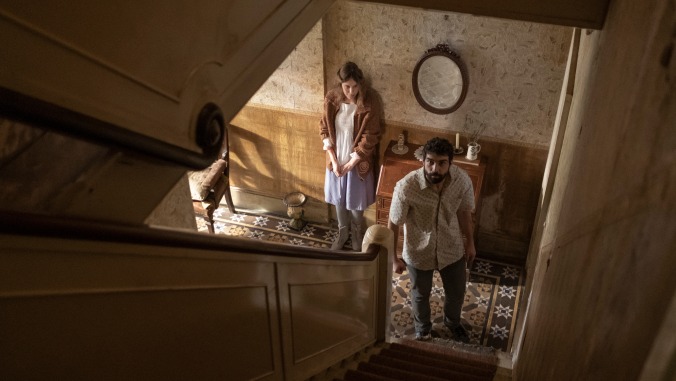Atonement comes at a heavy price in the unsettling feminist horror movie Amulet


Is it possible for someone to truly earn forgiveness if they refuse to forgive themselves? That’s the question that looms over Amulet, the feature directorial debut of the actor Romola Garai, best known perhaps for her role in Atonement. Were that title not already taken, it would perfectly fit Amulet: “Before your God, the ancients… They didn’t believe that you could forgive yourself,” confides the film’s main character, Tomaz, in a tense moment of spiritual reflection and grief. “It wasn’t yours to give.” He wants absolution without the conviction to confront his wrongdoing—a struggle that drives at the very heart of this unsettling supernatural thriller.
Tomaz, played by Alec Secăreanu of God’s Own Country, is an itinerant day laborer living in a squatter’s den on the outskirts of London. He’s also a former soldier, and is plagued by guilt-stricken nightmares about his time as the lone sentry of a checkpoint in the center of an enormous, foggy forest. At night, he binds his hands with duct tape, as if afraid of what he might do in his sleep. After a fire forces this destitute man onto the street, he’s taken in by the warm, generous Sister Claire (Vera Drake’s Imelda Staunton), who offers him a solution: In exchange for free room and board, he’ll work as a repairman and companion for Magda (Carla Juri), who’s caring for her dying mother.
Things are not as they seem, of course. Magda’s mother is either possessed by something evil or is that evil herself—the distinction is never made clear. What is clear is that Tomaz’s efforts to free Madga from her curse are an attempt to make up for past transgressions. Garai has described Amulet as “feminist horror,” and that makes more sense as the film goes on, slowly transforming from an eerie cerebral horror fantasy into a full-blown rape-revenge parable of cowardice and sin. It’s never quite said aloud what Tomaz did during the war to cause him so much guilt and pain, but there’s plenty of implication in his ascetic aloofness and furtive glances at Magda, before Garai reveals her hand to the audience in the final act. Sexually charged imagery and yonic symbolism abound: With every shot of a chaste white dress, blood-soiled bed sheet, or hand peeling apart the slit-opened innards of a dead fish, the film foreshadows the mounting physical tension between Tomaz and Magda.
Given the film’s feminist aspirations, it would be a mistake not to cite the immeasurable talents of its principally female cast. Given a much roomier role than the one she occupied in Denis Villeneuve’s Blade Runner 2049, Juri makes Magda deeply compelling in her emotional inscrutability; her arc is just as complicated, if not more so, than Tomaz’s—and it’s further complicated by how Amulet inverts and plays with the dynamic of a supposed protector and his charge. Staunton, meanwhile, masterfully pulls back a veil of care-worn magnanimity to reveal the contempt and disdain seething beneath.
Amulet is simply gorgeous to look at, too. That much is apparent from the film’s opening alone, as the camera steers into the dream space of Tomaz’s memories through a sea of evergreen treetops and looming forest trunks bathed in morning mist. Cinematographer Laura Bellingham interweaves the real and unreal into a tapestry of uneasy calm and malice; she breaks up the moments of emotional tension and collapse with tremulous shots of pooling rainwater, sun-dappled tree leaves, and snails inching across moss-laden rocks. This sensibility is echoed in the design and lighting of the film’s primary setting, Magda’s derelict house, with its patches of black mold and water damage seeping across the stucco plaster and peeling wallpaper. The lighting, which throws a yellowish malaise over darkened corridors and dining rooms, is as sickly as the house’s dying occupant. Amulet’s sound design is impressively distressing: a moaning refrain of hushed chanting and twinkling chimes that only grows more insidious and unsettling as the movie wears on.
Around the midway mark, we’re told through a scene between Magda and Tomaz that love is a sacrifice, and that the act of romance is nothing if not an offering at the altar of that sacrifice. “I told myself, if I freed you, I would have a right to be happy again,” Tomaz eventually tells Magda. But his sacrifice is little more than selfish self-flagellation; there’s a world of difference between an act of contrition and an appeal for absolution, one which reveals not only the heart of a person’s intent but of their character. Amulet elevates these themes of repentance and sin through deft editing, strong performances, and a chilling score. It’s an evocative, confident debut, recalling the metaphorical horror of Jennifer Kent’s The Babadook or Babak Anvari’s Under The Shadow, even as it announces the arrival of a singular new voice.